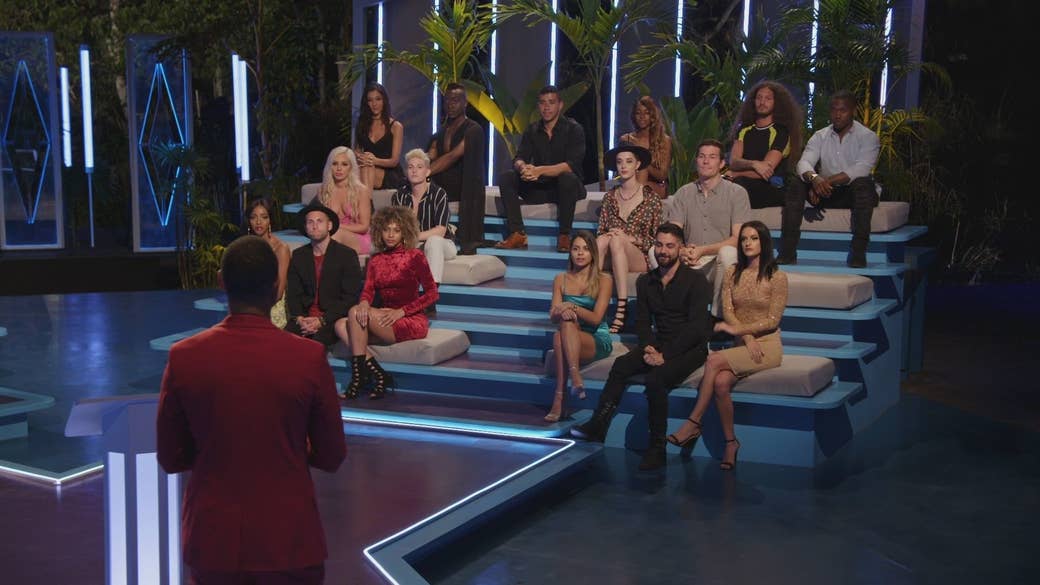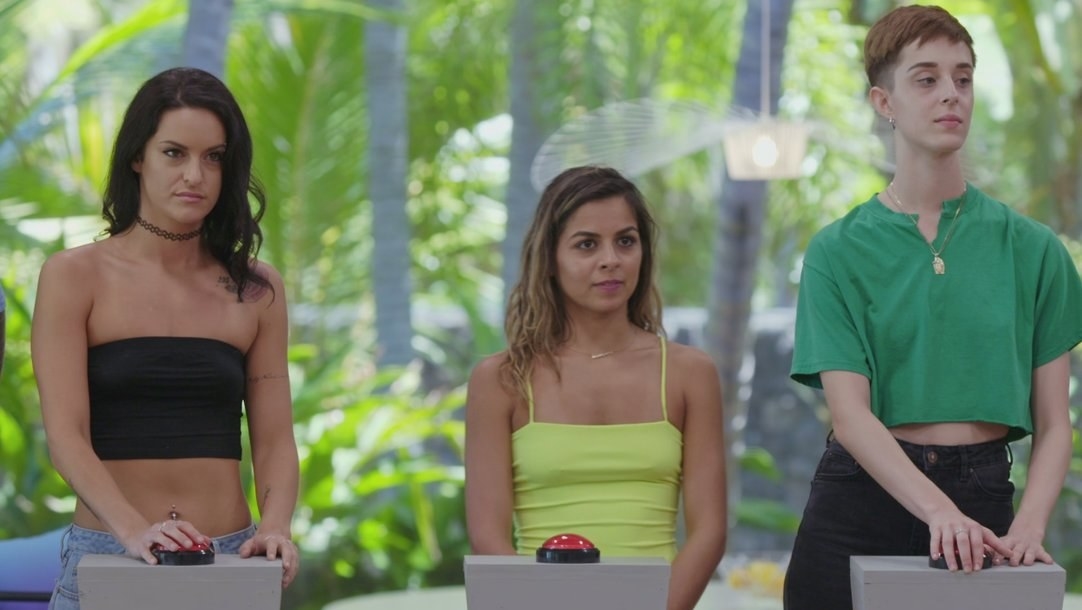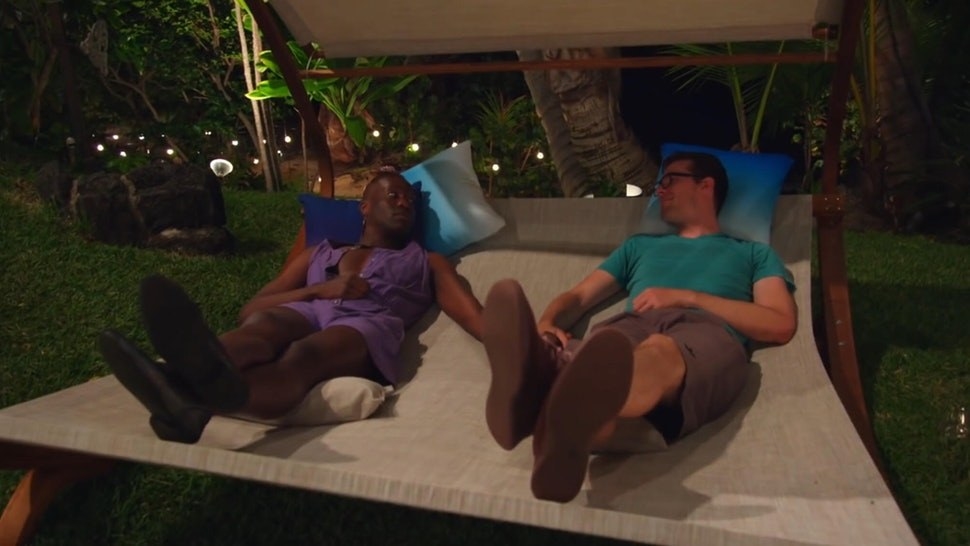
On Monday night, the season finale of MTV’s Are You the One? came to a close with champagne-fueled exclamations of victory. “This is for the queers,” Jenna said before the last two beams of light shot up, indicating that all the participants on this season of the reality dating show had found their “perfect matches” — winning them the game. “In the queer community, the odds are always stacked against us,” Jasmine explained, while her perfect match, Nour, nodded aggressively in agreement. Then there was Kari: “We showed the world that despite the odds, the queer community rises up again!”
Many members of the queer community were, in fact, going to bed. The credits rolled just after midnight. I was glad the group won, but I was also surprised. They were right — I’d been convinced they would fail. Not because I, a chaotic bisexual, wasn’t so sure I’d be able to spot my “perfect match” among 15 other chaotic bisexuals (as if following your heart was really as easy as the cliché suggests) — but because I know how hard it is for a queer person to try to play by straight people’s rules and win at their game.
Now in its eighth season, Are You the One? is a reality game show involving 16 singles who live together while participating in challenges, all in the hopes of correctly identifying their “perfect match.” These perfect matches are predetermined by a team of “relationship experts” and according to undisclosed criteria. If everyone in the house finds their match, the participants split a million-dollar cash prize. This season, every contestant was sexually fluid. As the host, Terrence J., kept reminding everyone, “For the first time in Are You the One? history, anyone could end up with anyone.”
I know how hard it is for a queer person to try to play by straight people’s rules and win at their game.
But by the penultimate episode, it seemed possible this season was poised to make Are You the One? history in another way: by featuring a group who wouldn’t find their perfect matches, losing them the game and $750,000. (They had lost a quarter of their potential million after they didn’t get any new “light beams,” representing perfect matches, at a matching ceremony.) With one last matching ceremony to go, there were still six unpaired cast members. The odds didn’t look good, and everyone knew it. At one point, Kari lamented, “I don’t want the queer season to be the one that fails.”
Technically, one straight season has failed before, though the rules in that season were deliberately set to be harder than other seasons. So if this season’s group failed to win the game, theirs would have been a uniquely queer failure.
If we think of failure as a foreclosure of a particular possibility, then queers are set up to fail. As Jack Halberstam explained in The Queer Art of Failure, the refusal of heteronormative success is a constitutive part of queerness — not merely because queers may choose alternative lifestyles, but also because pathways toward traditional markers of success have been barred from us. Capitalism necessitates winners and losers, and winners necessitate exploitation and greed. “Heteronormative common sense,” Halberstam wrote, “leads to the equation of success with advancement, capital accumulation, family, ethical conduct, and hope.” Queer failure is as much about the young homosexual who strides into their shit job an hour late with a comically large iced coffee as it is about the stately lesbian couple who are the proud parents of four rescue dogs, as it is about the queer gutter punk who might spend the dollar you give them on drugs instead of food — they all threaten the straight flow of capital to produce more of itself, more of the same, for only a few.
I began watching this show skeptical of the very concept of a “perfect match,” because to be queer and to believe in something like a soulmate suggests that we always know exactly who we are and exactly whom we want — and, even less likely, that your soulmate would know the same about themselves. But I finished the show confident that the cast had complicated what is so often taken for granted by heterosexuals: the clear parameters of winning and losing.
Again and again, the cast members convinced themselves that they had found The One, only to be eventually disappointed in the “Truth Booth,” which reveals whether a set of participants are or aren’t perfect matches. How can they be wrong, they cried, when they were following their heart? But “following your heart” isn’t so easy when you have spent years repressing your desires and ignoring your intuition.

A lot of heterosexual static interferes with our ability to discern what we actually feel from what we’ve been told to want. From the very first episode of this season, biases and internalized homophobia become central issues of the show. Nour, a Jordanian American woman not out to her whole family, picks cis masc Justin over cis femme Amber in the first episode, only to discover that they weren’t a perfect match in the Truth Booth. She admits that she only picked him because he was safe and familiar (read: a cis man). Justin, who presents himself as having a chill ease with his own bisexuality, responds to Nour’s uncertainty with frustration: “You need to fucking follow your heart.”
When the host of the show, Terrence J., asks the cast why they’re all here, they know to say it’s because they “suck at relationships,” and indeed, the cast members will repeat the sentiment throughout the season. Sucking at relationships isn’t exactly something bisexuals can exclusively claim as our own, like mood lighting or Marlon Brando. But we do have our own unique set of predicaments.
Are You the One?’s refrain of “anyone could end up with anyone” is a positive twist on a tired allegation against bisexuals: having multiple gender options means we’re greedy and slutty, both vilified and sexualized. While the contempt (mingled with titillation) inherent in this allegation was never lost on me, I used to agree — even took it as a point of pride. At our best, queer people are more likely to be attracted to bodies not conventionally celebrated for their beauty. But at our worst, queer people can internalize heteronormative disgust for difference; LGBTQ dating scenes are certainly not free of fatphobia, femmephobia, transphobia, or colorism. (I would love to see Season 9 of Are You the One? represent what my queer community looks like, one inclusive of trans women, fat people, people with disabilities, and more nonbinary or genderfluid people in general.)
The freedom to find more than one gender presentation attractive can make it difficult sometimes to know exactly whom you are attracted to versus whom you might be socialized to be attracted to. I had to remind myself of this difficulty when Jonathan, long-locked and unwoke, chose Justin to sit with him during the fifth beam ceremony. Basit, black and beautiful, genderfluid and glittery, had had their eye on Jonathan from the beginning. In spite of their emotional connection, Jonathan admitted that he didn’t see a romantic future with Basit, even after Basit chose him in the first two matching ceremonies, AND after they grew closer in drag at the queer prom in Episode 4. It stung every time Jonathan used the wrong pronouns for Basit or made an offensive remark about being attracted to “healthy” (read: muscular gym-bro) bodies, speaking to the femmephobia and body-shaming pervasive in cis gay male communities.

Eventually, Jonathan made Basit a flower crown and apologized: “I was so distracted by all the sequins and glitter that I didn’t take time to look at what was behind all that. And what’s underneath that is a beautiful person. I was distracted by someone else in the house and also by your costume.” I bristled at Jonathan’s explanation. Glitter isn’t a distraction, and a sequined mesh crop top is a blessing, not a costume.
When they kissed, a chyron popped up, announcing to the audience, if not the cast, that Basit and Jonathan were a perfect match. Another “first time in Are You the One? history”: the show’s editors had to reveal a perfect match rather than let redditor sleuths spoil the reveal for them, all because the bisexuals, as if contractually obligated to be living memes, could not do math (yet).
It seems that now, in real time, the two are perhaps still dating. Basit wrote in a recent Instagram post, “I been knowing, he’s been growing, and now you see why we’re still glowing.” Even though I could never be as patient as they were in helping Jonathan unlearn his internalized phobias, Basit was right to see the potential for change as a key part of queer identity. (Then again, I, too, have sat patiently with more than one cis, seemingly straight guy friend as they’ve unburdened themselves of their queer desires, ready to talk them through making the leap. I call it “Bi Eye for the Shy Guy.”)
Whether you identify as bi, bi+, pan, or sexually fluid, you have likely gone through many answers to the question of what turns you on. I’ve been drawn to the straight girls I made up games with on the playground to straight girls in college playing games with me; from cis men who wear lesbian button-downs to sweetheart femmes; to anyone tall, gay, and handsome; to anyone who wears a carabiner with a certain sprezzatura. The more confident I’ve grown in my queer identity, the more I’ve found queerness itself to be the turn on.
Being bi isn’t a phase — it’s so, so many phases. Wanting to hold onto the word “bisexual” not to uphold the binary, but for solidarity’s sake. Cycling through other words: fluid, queer, dyke. Wondering if part of you disappears if you’re in a straight-passing relationship. Doubting whether you could ever be seen by a straight person, let alone love them. Feeling self-conscious about being a brass tack if you’re dating a gold star, and hating yourself for even thinking in those terms. Dating someone with a totally different gender identity or expression only to realize you have once again fallen for the exact same person with the exact same problems. Second-guessing your desire if you haven’t gotten to take one particular interest out for a spin. If bisexuality implies “two” of anything, it’s not about the gender binary — it’s about second-guessing yourself. So many of these phases feel like failures to just figure it out already.
Perhaps we can explain some of the biphobia in the queer community — not to mention internalized biphobia — with the bisexual’s difficulty in coming to a permanent, static understanding of their own sexuality. As Are You the One? so messily illustrates, we are coming to understand that queerness is capacious enough to accept contradiction and evolution. But for a certain kind of person, not having a clear idea of what and whom you want might look like failure.
After Kari does the math, nerdy Danny, who feels sexiest in a skirt, and transmasc fuckboi Kai figure out that they are, in fact, “perfect matches.” Reflecting on their journey together, Danny quotes the Irish writer Samuel Beckett: “Ever tried. Ever failed. No matter. Try again. Fail again. Fail Better.”
Suffice it to say that Beckett’s jet-black humor was not meant to serve as inspiration to work harder, achieve your dreams, and to build a brighter future. Silicon Valley startup culture has co-opted the quote to suggest that even failures can be interesting disruptions, as if the arc of history bends toward individual success. But it’s a mistake to assume this phrase is about optimism — every failure an improvement on the last until eventually, you finally succeed. In other words, failing upward.
But when Danny quotes Beckett to Kai, he isn’t suggesting they “fail better” to eventually meet a straight standard. The cast, for the most part, is optimistic about finding their perfect matches, but what feels significant about this season is their queer attitude toward failure. They try on possibilities and regard the relationships that didn’t work as steps not toward perfect, happy endings, but simply steps forward.
We found out a lot on Twitter after the finale aired. Amber, wisely, had a threesome with Justin and Remy the night before the matching ceremony. Confirmed nonperfect matches Paige and Remy have been dating IRL for months. Justin, Kari, and Max had been in a love triangle this whole time. Jenna still hooked up with Kai even after they failed to be proven matches in the Truth Booth. Brandon and Remy had a whole-ass affair we didn’t even get to see. As Brandon said, they were all comfortable being with their “perfect no-match.” Whatever the show’s producers decided to show us, this group was never playing by straight rules.
Whatever the show’s producers decided to show us, this group was never playing by straight rules.
The laughable self-importance of the refrain “for the first time in Are You the One? history” elides what queer theorist José Muñoz called the limited, pragmatic politics of “the here and now.” What the queer season of this show teaches us about queer love is that its supposed failures are part of queer world-building — they suggest a future, a “then and there” on the horizon, where we have more options available to us than the set track of heteronormative milestones. “Queerness and the politics of failure are linked insofar as they are about doing ‘something else,’” he wrote, that “something else” being a gesture toward a possibility not yet named, difficult to imagine because of how utopic in scale it could be and how limiting the inhibition of heteronormativity is on our imaginations.
The queer season of Are You the One? wasn’t important because the gays won a cash prize that straight people have won before, or because they beat the odds. It wasn’t even important for the queer representation — studio execs are only going to get more hip to how they can monetize our mess. It was important because it flaunted a queer version of success: nonlinear, accepting of mistakes, and measured not by certainty and stability, but by joy, pleasure, and the willingness to imagine something better.
Are You the One? may have failed to bring about the end of the heterosexual world order. But it did what queer failure is supposed to do: to be critical of what is and to make more room for the possibility of something else. ●
Natalie Adler has a PhD in comparative literature and writes about queer feminism and leftist politics.
